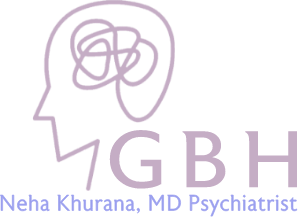Schizophrenia Diagnosis and Treatment in Norcross, GA
Diagnoisis and Evidence-Based Care for Individuals with Schizophrenia From Experienced Doctor in Norcross, GA
What is Schizophrenia?
Schizophrenia is a chronic and severe mental health disorder that affects an individual’s thoughts, emotions, and behaviors. It can impact daily functioning, relationships, and overall well-being and lead to psychosis. While schizophrenia is a lifelong condition, proper schizophrenia treatment can help individuals manage symptoms and lead fulfilling lives.
Schizophrenia is More Common Than Previously Thought
Recent studies indicate that twice as many U.S. adults experience schizophrenia spectrum disorders than previously estimated (RTI International, 2023). While it affects a relatively small percentage of the population, its impact is significant.
At Georgia Behavioral Health, our doctor diagnoses schizophrenia and offer personalized, evidence-based schizophrenia treatment in Norcross, GA, and nearby areas to help individuals achieve stability and enhance their quality of life.
Symptoms of Schizophrenia
Schizophrenia symptoms are generally categorized into three groups: positive symptoms, negative symptoms, and cognitive symptoms.
Positive Symptoms (Psychotic Symptoms)
- Hallucinations (seeing or hearing things that aren’t there)
- Delusions (strong false beliefs not based in reality)
- Disorganized thinking and speech
- Unusual or erratic behavior
Negative Symptoms
- Social withdrawal and isolation
- Reduced motivation or difficulty completing tasks
- Flat affect (lack of facial expressions or emotions)
- Difficulty experiencing pleasure (anhedonia)
Cognitive Symptoms
- Trouble focusing or paying attention
- Memory difficulties
- Difficulty making decisions or processing information
Schizophrenia often emerges in late adolescence or early adulthood, but early intervention is key in improving outcomes (Child Mind Institute).
What Causes Schizophrenia?
The exact cause of schizophrenia is unknown, but research suggests a combination of genetic, biological, and environmental factors contribute to its development.
- Genetics: Having a family history of schizophrenia increases the risk.
- Brain Chemistry & Structure: Differences in brain activity, neurotransmitter imbalances (dopamine and glutamate), and structural abnormalities may contribute.
- Childhood Trauma & Stress: Studies show a strong link between childhood trauma and schizophrenia, with early life stressors increasing vulnerability (Inyang et al., 2022).
- Substance Abuse: Drug use, particularly cannabis and hallucinogens, may trigger psychosis in individuals with genetic predispositions (Volavka & Swanson, 2010).
Understanding the risk factors of Schizophrenia can help with early intervention and prevention.
The Importance of Early Schizophrenia Treatment
Early treatment of first-episode psychosis (FEP) is critical for better long-term outcomes. Delaying treatment can lead to more severe symptoms and increased relapses (Uçok et al., 2006). Seeking professional help as soon as schizophrenia symptoms appear can make a significant difference in recovery.
Schizophrenia Treatment Options
At Georgia Behavioral Health, our schizophrenia doctors believe in a holistic, patient-centered approach to schizophrenia care, focusing on symptom management, stability, and quality of life.
01. Medication Management
- Antipsychotic medications help manage hallucinations, delusions, and disorganized thinking.
- Newer second-generation antipsychotics may have fewer side effects.
- Regular medication monitoring ensures effectiveness and minimizes side effects.
02. Psychotherapy & Behavioral Therapies
- Cognitive Behavioral Therapy (CBT): Helps patients recognize and manage distorted thoughts.
- Psychoeducation: Provides individuals and families with information about schizophrenia.
- Social Skills Training: Helps improve communication and relationships.
03. Supportive Services & Rehabilitation
- Case Management & Support Groups: Assists with daily living skills, employment, and social integration.
- Family Therapy: Helps loved ones understand schizophrenia and provide effective support.
- Community Resources: Access to housing support, vocational programs, and peer support networks.
04. Innovative Therapies
- Transcranial Magnetic Stimulation (TMS): A promising non-invasive treatment for individuals with treatment-resistant symptoms.
- Crisis Intervention Services: Immediate care for individuals experiencing severe symptoms or relapse.
Living with Schizophrenia: Hope & Recovery
If you or a loved one is experiencing symptoms of schizophrenia, help is available. At Georgia Behavioral Health, our schizophrenia therapists are committed to providing compassionate and expert care for individuals facing schizophrenia and other mental health challenges. Contact us today to get effective schizophrenia treatment near you!
FAQs About Schizophrenia Treatment
Can schizophrenia be cured?
Schizophrenia is a lifelong condition, but with proper treatment, symptoms can be managed effectively, allowing individuals to lead stable and fulfilling lives.
